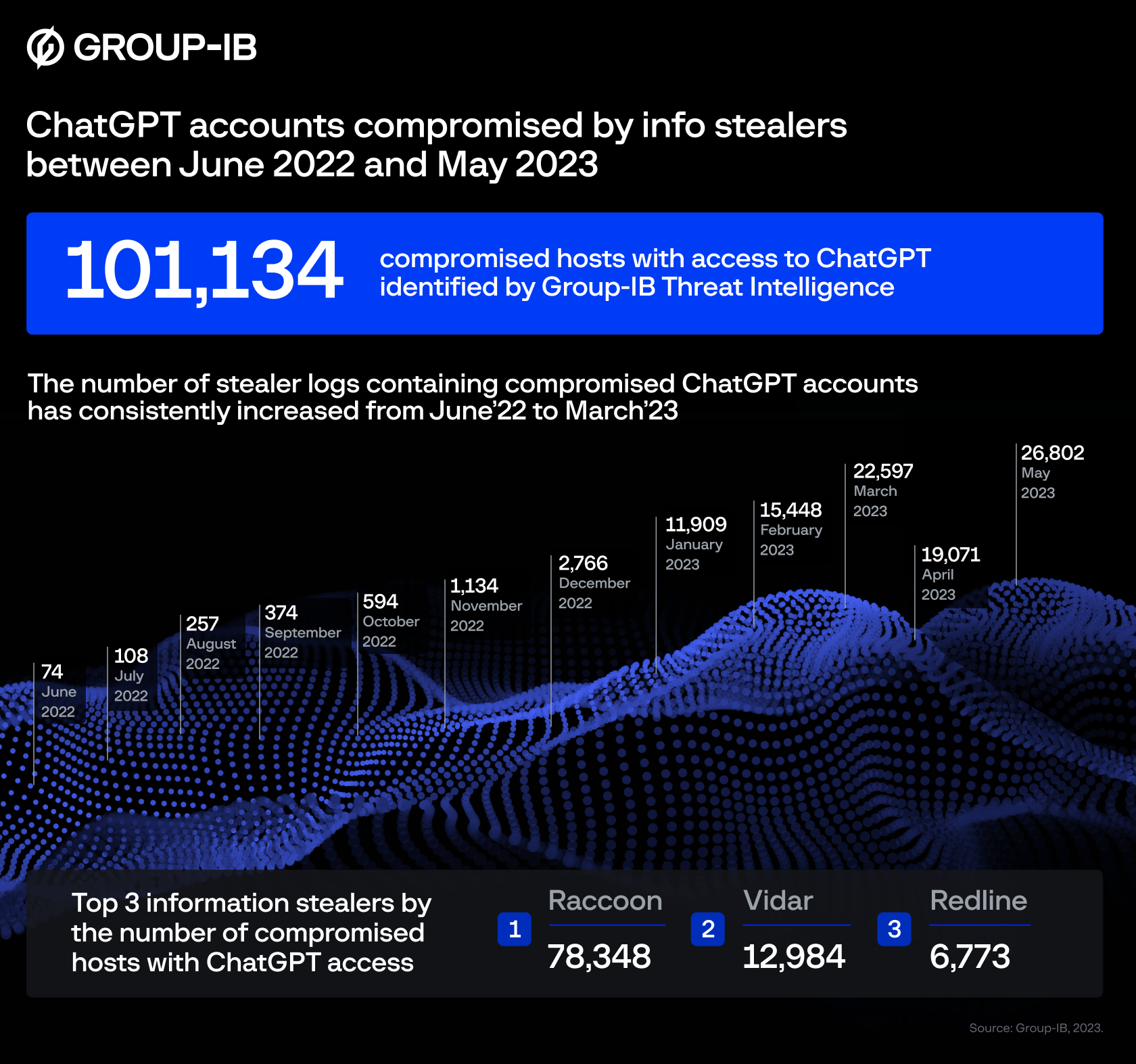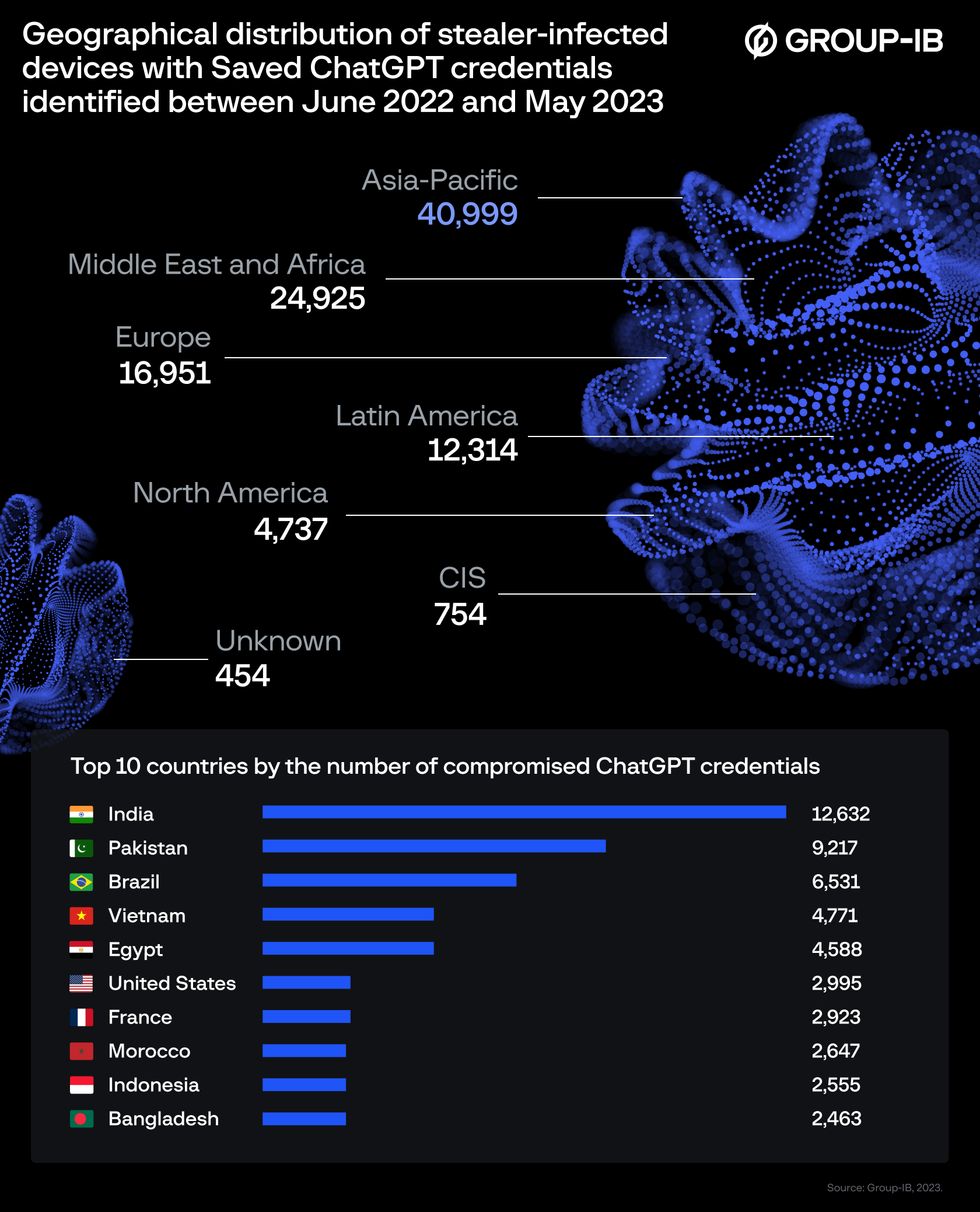News
100K+ Compromised ChatGPT Accounts Found On Dark Web
Egypt, Morocco, and Algeria top the list in the Middle Eastern region.

Global cybersecurity leader Group-IB has identified 101,134 infected devices with saved ChatGPT credentials. Throughout 2023, the company’s Threat Intelligence Platform found compromised account details in 26,802 malware logs traded on dark web marketplaces.

According to Group-IB’s findings, the Asia-Pacific region suffered the greatest concentration of ChatGPT credentials offered for sale, followed by the Middle East and Africa (MEA) region in second place.
Group-IB tech experts explained that when employees take advantage of ChatGPT to optimize business communications and marketing texts, the queries and responses are stored within the AI app. Consequently, any unauthorized access to a ChatGPT account could unearth a wealth of sensitive information.
Also Read: The Largest Data Breaches In The Middle East
Group-IB’s dark web analysis revealed that most compromised ChatGPT accounts were breached by a popular malware program known as “Raccoon Info Stealer”. The virus is often sent by email and can be used by hackers to gain access to sensitive data stored in internet browsers.
In the MENA area, accounts from users in Egypt, Morocco, Algeria, and Turkey topped the “most-infected” list, potentially exposing companies in the region to multiple threat actors.

“Many enterprises are integrating ChatGPT into their operational flow,” explained Dmitry Shestakov, Head of Threat Intelligence at Group-IB. “Employees enter classified correspondences or use the bot to optimize proprietary code. Given that ChatGPT’s standard configuration retains all conversations, this could inadvertently offer a trove of sensitive intelligence to threat actors if they obtain account credentials. At Group-IB, we continuously monitor underground communities to identify such accounts promptly”.
To mitigate the risks posed by compromised ChatGPT accounts, Group-IB suggests that users update passwords using current best practices while also implementing two-factor authentication.
News
Rabbit Expands Hyperlocal Delivery Service In Saudi Arabia
The e-commerce startup is aiming to tap into the Kingdom’s underdeveloped e-grocery sector with a tech-first, locally rooted strategy.

Rabbit, an Egyptian-born hyperlocal e-commerce startup, is expanding into the Saudi Arabian market, setting its sights on delivering 20 million items across major cities by 2026.
The company, founded in 2021, is already operational in the Kingdom, with its regional headquarters now open in Riyadh and an established network of strategically located fulfillment centers — commonly known as “dark stores” — across the capital.
The timing is strategic: Saudi Arabia’s online grocery transactions currently sit at 1.3%, notably behind the UAE (5.3%) and the United States (4.8%). With the Kingdom’s food and grocery market estimated at $60 billion, even a modest increase in online adoption could create a multi-billion-dollar opportunity.
Rabbit also sees a clear alignment between its business goals and Saudi Arabia’s Vision 2030, which aims to boost retail sector innovation, support small and medium-sized enterprises, attract foreign investment, and develop a robust digital economy.
The company’s e-commerce model is based on speed and efficiency. Delivery of anything from groceries and snacks to cosmetics and household staples is promised in 20 minutes or less, facilitated by a tightly optimized logistics system — a crucial component in a sector where profit margins and delivery expectations are razor-thin.
Despite the challenges, Rabbit has already found its stride in Egypt. In just over three years, the app has been used by 1.4 million customers to deliver more than 40 million items. Revenue has surged, growing more than eightfold in the past two years alone.
Also Read: Top E-Commerce Websites In The Middle East In 2025
CEO and Co-Founder Ahmad Yousry commented: “We are delighted to announce Rabbit’s expansion into the Kingdom. We pride ourselves on being a hyperlocal company, bringing our bleeding-edge tech and experience to transform the grocery shopping experience for Saudi households, and delivering the best products – especially local favorites, in just 20 minutes”.
The company’s growth strategy avoids the pitfalls of over-reliance on aggressive discounting. Instead, Rabbit leans on operational efficiency, customer retention, and smart scaling. The approach is paying off, having already attracted major investment from the likes of Lorax Capital Partners, Global Ventures, Raed Ventures, and Beltone Venture Capital, alongside earlier investors such as Global Founders Capital, Goodwater Capital, and Hub71.
























